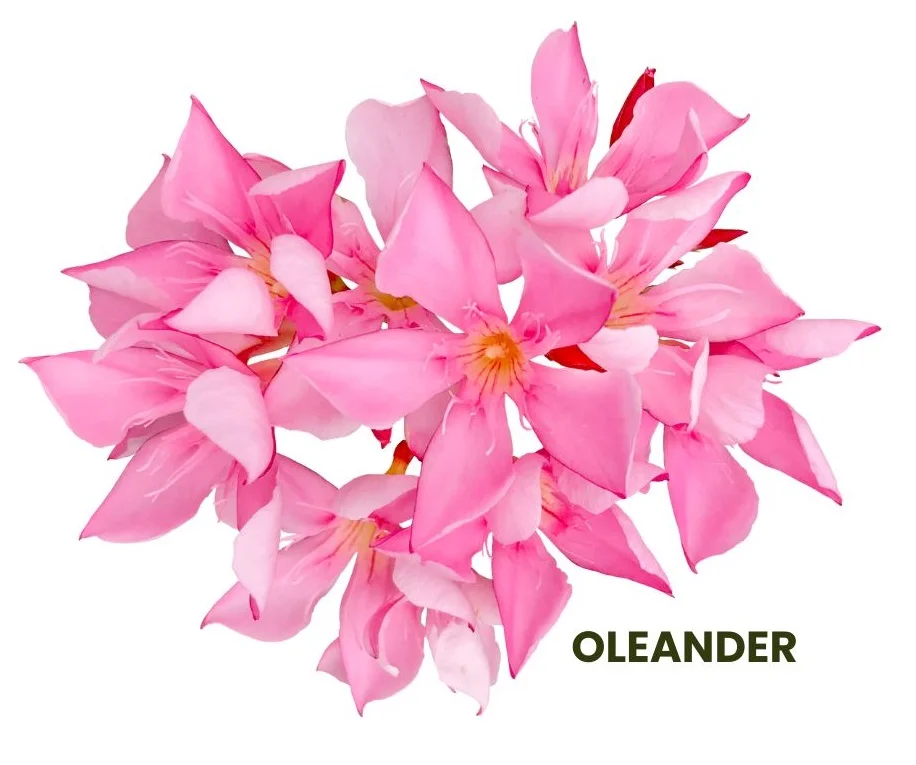Oleander, scientifically known as Nerium odorum, is a homeopathic remedy known for its pronounced effects on the skin, heart, and nervous system.
It is particularly effective in treating paralytic conditions, cramp-like contractions of the upper extremities, hemiplegia, and difficulty in articulation.

Table of Contents
ToggleSOURCE INFORMATION
Scientific Classification
- Kingdom: Plantae
- Clade: Angiosperms
- Clade: Eudicots
- Order: Gentianales
- Family: Apocynaceae
- Genus: Nerium
- Species: N. oleander
Origin
- Oleander is a highly toxic shrub native to the Mediterranean region and Asia.
- It is widely cultivated for its attractive flowers but is known for its toxic properties.
Historical Fact
- Despite its toxicity, Oleander has been used in traditional medicine for centuries.
- Its therapeutic properties were recognized early on, particularly in treating skin conditions and heart problems.
- Homeopathically, it was introduced for its ability to address paralytic and neurological conditions, among other ailments.
DRUG PATHOGENESIS
- Oleander primarily acts on the nervous system, heart, and skin.
- It induces and treats paralytic conditions with associated cramp-like contractions and addresses issues like hemiplegia and difficult articulation.
- It also impacts mental faculties, causing weak memory and slow perception.
DETAILED ORGAN SYMPTOMS
MIND
- Memory Weakness: Difficulty recalling information, leading to forgetfulness.
- Slow Perception: Delay in processing information and reacting to stimuli.
- Melancholy: Persistent feeling of sadness and despondency.
- Obstinate Constipation: Difficulty in bowel movements, resistant to usual treatments.
HEAD
- Vertigo: Dizziness and loss of balance, particularly when changing position or focusing on objects.
- Pain: Sensation as if the head would burst, indicating intense pressure.
- Numb Feeling: A sense of numbness in the head, reducing tactile sensations.
- Eruptions on Scalp: Skin issues on the scalp, including humid, fetid spots and herpetic eruptions.
EYES
- Double Vision: Seeing two images of a single object.
- Watery Eyes: Excessive tearing when reading.
- Sensory Distortion: Feeling as though the eyes are being pulled back into the head.
FACE
- Pallor: Unusually pale complexion.
- Sunken Appearance: Hollow look, especially around the eyes, with bluish rings.
STOMACH
- Canine Hunger: Extreme hunger leading to hurried eating without actual appetite.
- Vomiting: Expulsion of ingested food and greenish fluid.
ABDOMEN
- Borborygmus: Rumbling noises in the abdomen due to gas.
- Ineffectual Urging: Frequent need to defecate without successful bowel movements.
- Burning Pain in Anus: Intense burning sensation in the anal area.
CHEST
- Oppression: Feeling of weight on the chest, causing difficulty in breathing.
- Asthmatic Symptoms: Difficulty in breathing, especially when lying down.
- Palpitation: Noticeable and often irregular heartbeat.
EXTREMITIES
- Weakness and Paralysis: Lack of strength and movement in lower limbs.
- Cold Feet: Constant feeling of coldness in the feet.
- Stiffness and Swelling: Inflammation and rigidity in the fingers and joints.
SKIN
- Itching and Pimples: Persistent itching and formation of small bumps.
- Herpes: Skin eruptions characteristic of herpes.
- Pruritus: Severe itching, especially of the scalp.
MODALITIES
- Worse: When undressing, at rest, and with friction from clothes.
- Better: No specific amelioration conditions noted.
RELATIONSHIP WITH OTHER DRUGS
- Compare with: Conium (Con), Natrum Muriaticum (Nat-m), Rhus Toxicodendron (Rhus), Causticum (Caust), Lathyrus (Lath).
- Oleander Constituents: Contains Oleandrin and Nerein, similar to Digitalin, which slows and strengthens the heart’s contractions.
- Antidotes: Camphor (Camph) and Sulphur (Sulph).
DOSE
- Potency: Third to thirtieth potency is typically recommended.
Frequently Asked Questions (FAQs)
Q: What conditions can Oleander treat?
A: Oleander is used for treating paralytic conditions, cramp-like contractions, hemiplegia, vertigo, digestive issues, skin eruptions, and respiratory difficulties.
Q: How does Oleander affect the heart?
A: Oleander contains compounds like Oleandrin and Nerein, which slow the heart rate, increase its power, and improve regularity.
Q: What are the typical symptoms indicating the need for Oleander?
A: Symptoms include vertigo, double vision, extreme hunger with nausea, oppressive chest pain, paralytic weakness in limbs, and itchy, sensitive skin.
Q: What are the modalities of Oleander?
A: Symptoms worsen with undressing, at rest, and with friction from clothes.
Meaning of Difficult Words
- Hemiplegia: Paralysis of one side of the body.
- Diplopia: Double vision.
- Vertigo: A sensation of spinning dizziness.
- Borborygmus: Rumbling or gurgling noise made by the movement of fluid and gas in the intestines.
- Dyspnea: Difficult or laboured breathing.
- Pruritus: Severe itching.
- Oedema: Swelling caused by excess fluid trapped in the body’s tissues.
